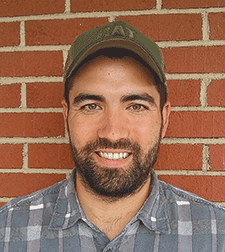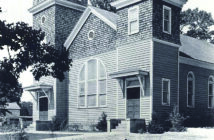Jack T. Shoosmith II was named after his grandfather.
Shoosmith, 29, remembers his “Poppa” as someone who worked “extremely hard,” drove a logging truck, welded and then drove a bulldozer.
A project manager for a local construction company, Shoosmith said his grandparents grew up poor in Chester. “When they got married, there was no running water in their house,” said Jack, the oldest grandson of Jack and Nina Shoosmith.
“Grandpa dropped out of high school and went to work for his two older brothers [Dick and Etzel],” Jack said. “He was driving a logging truck at age 14.”
The brothers grew the business — Shoosmith Brothers Inc. — which became mainly known for construction. The brothers started a landfill in the 1970s, Jack said. The landfill was later sold to Tony Lucas, who had married Jack’s aunt, Kathy Shoosmith. The landfill was later sold to a Texas business, Jack said.
Land that the Shoosmith family purchased over the years makes up the majority of 1,675 acres that the Chesterfield Economic Development Authority planned to buy for a megasite that would be used to attract a manufacturing company. The EDA’s involvement in that process recently came to an end when its board voted to withdraw a rezoning application for the land.
In 1973, Shoosmith Brothers Inc. bought 125 of the acres, according to county residential appraisal manager James E. Welsh. The company later purchased 1,032.6 and 304.6 acres from Continental Land Sale Inc. in 1996. A separate 137 acres that was part of the megasite proposal is owned by a trustee of Joseph Hotz, who purchased it in 1964.
Although some have criticized the Shoosmith family for trying to sell the land, Jack came to his family’s defense.
“A lot of people see money and success and view it negatively without even knowing the people,” he said.
While growing up, he said he spent a lot of time with his grandfather, who died when Jack was 17.
His grandfather gave back to the community. “He paved church parking lots for free; bought an SUV for the Bensley-Bermuda Rescue Squad; gave to the YMCA; he would bring equipment and operators [and]fight forest fires and never sent them a bill. He gave money to Chesterfield and state police,” Jack said.
Some locals have promoted the idea of the county buying the land and setting it aside as a conservation area.
Although he didn’t necessarily support putting a manufacturing plant on the land, Jack believes his 85-year-old grandmother, Nina, has a right to sell the property (which is now in the name of Thomas LLC).
“She’s been taxed heavily [on the land], and she’s just trying to sell it,” Jack said. The land was rezoned residential as a part of the failed Branner Station development in 2007 and had agricultural zoning prior to that, Jack said.
“I don’t really want to see anything built there,” he said. “Chester and Chesterfield has gotten too busy for me.”
The land “is pretty much all forested land,” he said. “I love that piece of property. I grew up hunting it, and I hate to see it go, but it’s not my choice. I support her decision to sell it.”
When the EDA recently voted to withdraw an application to rezone the property from residential to industrial, it also suggested that the county purchase the land.


